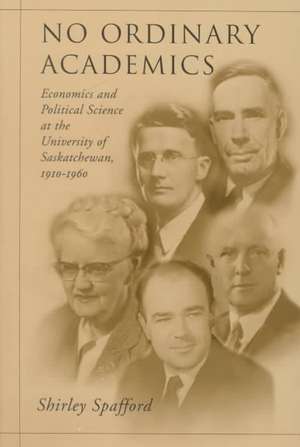No Ordinary Academics
Autor Shirley Spafforden Limba Engleză Hardback – 30 iun 2000
The Keynesian economist Mabel Timlin, the first woman to be elected President of the Canadian Political Science Association, and first woman to be elected to Section II of the Royal Society of Canada, went from secretary to student to Professor during her years at the University of Saskatchewan (1921 to 1959). In No Ordinary Academics Shirley Spafford describes the circumstances and people that turned a department in an isolated prairie university into a thriving intellectual community that would nurture some of Canada's best minds.
Politics, Economics, Economic History, and other fundamental determinants of Canadian life arose from the research of liberal thinkers such as Timlin, Frank Underhill, MacGregor Dawson, and Norman Ward, who saw the necessity of the government's role in economic development.
These were academics who knew how not to be dull - and this institutional biography is the same. As Spafford narrates the academics' daily lives, their struggles to gain recognition, the transfer of power from the president's office to the peer group of faculty members, and the cross-pollination of ideas with the University of Toronto, the drama of an intellectual community of the University of Saskatchewan is brought forth with an inspired originality, engendered, by the excitement of the place itself.
Preț: 386.11 lei
Preț vechi: 416.08 lei
-7% Nou
73.88€ • 79.01$ • 61.60£
Carte indisponibilă temporar
Specificații
ISBN-10: 0802044379
Pagini: 304
Dimensiuni: 160 x 234 x 26 mm
Greutate: 0.59 kg
Editura: University of Toronto Press (Scholarly Pub)
